Where and how to ripen peppers at home: tips for storing vegetables and speeding up their ripening
Ripening - bringing unripe fruits to a state of full ripeness. Vegetables taken from the bushes can be in one of two states - biological maturity (in this case they are consumed immediately) or technical (such fruits are transported, sold).
Knowing how to ripen peppers at home, you save the whole crop no loss.
The content of the article
Is it possible to shoot unripe bell peppers
Peppers in the period of technical ripeness have not yet gained corresponding color, but quite suitable for consumption. Can they ripen such fruits? Yes, if you keep them warm. If you put other ripe vegetables along with green peppers, then ripening will occur faster.
Why shoot
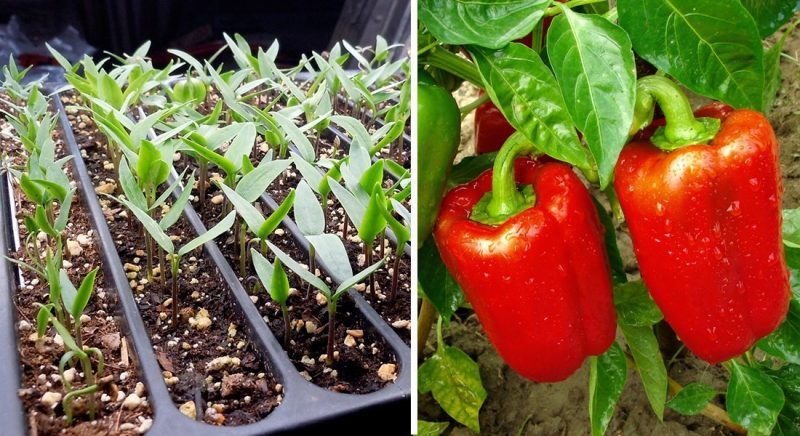
Unripe vegetables are removed from the beds when they have to be transported for a long time or frost is expected. During transportation and being on store shelves, the peppers reach biological ripeness. If ripe, plucked and transported, the fruits will quickly deteriorate.
In summer cottages, vegetables are removed to the stage of full ripeness, so that new ovaries form. This increases the yield from each bush.
How to store unripe peppers
The task of any vegetable grower is to preserve the harvested crop for a long time. Bell pepper in technical ripeness has the same beneficial qualities as in biological ripeness, while in a cool place the shelf life is increased to 2 months.
Attention! Only whole fruits with an undamaged surface are subject to long-term storage. Therefore, vegetables are plucked along with the stalk.
Terms and conditions of storage
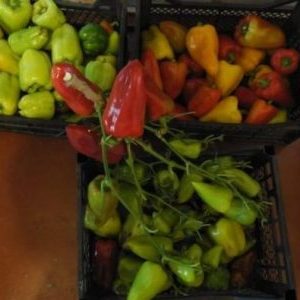
Undamaged fruits at the stage of technical maturity are kept indoors at a temperature of 0 ... + 3 ° C and a humidity of about 80% for 60–90 days.
In a cellar or basement at low temperatures, the peppers do not lose their presentation for 70–90 days.
In freezers, vegetables remain fresh for 5-6 months.
Where is it better to store
The conditions for keeping ripe and green peppers differ significantly. Mature vegetables will not sit at room temperature for long and will rot within a few days. Therefore, they are consumed immediately.
Important! Before sending vegetables for storage, ripe fruits are separated from unripe ones.
Unripe vegetables go bad quickly in the refrigerator. They are kept at a temperature of + 10 ... + 12 ° C and high humidity (80–85%), preferably in a cellar or basement. The room should be darkened, as in bright light the vegetables will start to be damaged.
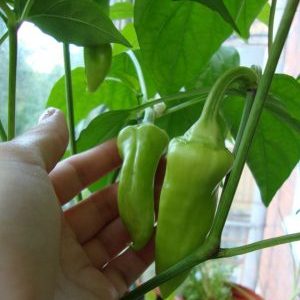
For better keeping quality, use wooden boxes or cardboard boxes with side holes. Each fruit is wrapped in paper and placed in rows in a container. Sometimes vegetables are sprinkled with sawdust or placed in sand.
In rare cases, with a large amount of harvest, it is treated with a 1% solution of copper sulfate (copper sulfate).
Under the right conditions, unripe fruits will not deteriorate for 2-3 months.
In the refrigerator, each fruit is wrapped in paper or packed in a plastic bag. Good results are obtained by lubricating the skins of vegetables with sunflower oil: it forms a protective film and prolongs the freshness of the fruit.
If the peppers begin to rot, cut off the damaged areas, remove the core with seeds, chop the fruits into strips, put them in bags in small portions and place them in the freezer.Such vegetables retain their useful and taste qualities for up to 6 months.
Some housewives dry bell peppers in a vegetable dryer or oven. To do this, the cored fruits are cut into strips and dried on a baking sheet at a temperature of + 45 ... 55 ° C for 8 hours. Such peppers are stored in sealed jars.
By the way! Vegetables are dried in the sun for 4-5 days.
How to ripen pepper
Various methods are used to ripen bell peppers. How to store pepper so that it turns red faster? To do this, put several red or yellow ripe vegetables between the harvested fruits, place them in a warm, dark place for 4-5 days.
Storage temperature and conditions
For long-term keeping, the peppers are picked at the stage of technical ripeness. They are placed in 3 layers in small containers, which are left in a room with a temperature of + 10 ... + 12 ° C and an air humidity of 85-90%... Under these conditions, the fruits fully ripen in 1 month. The temperature is then lowered to 0 ° C to prevent the development of diseases. In room conditions, ripening is much faster.
One way to store fruit in a basement or cellar is by hanging the bushes right from the roots. Plants are planted at home in flower pots or wooden boxes for further ripening of vegetables.
Life hacks
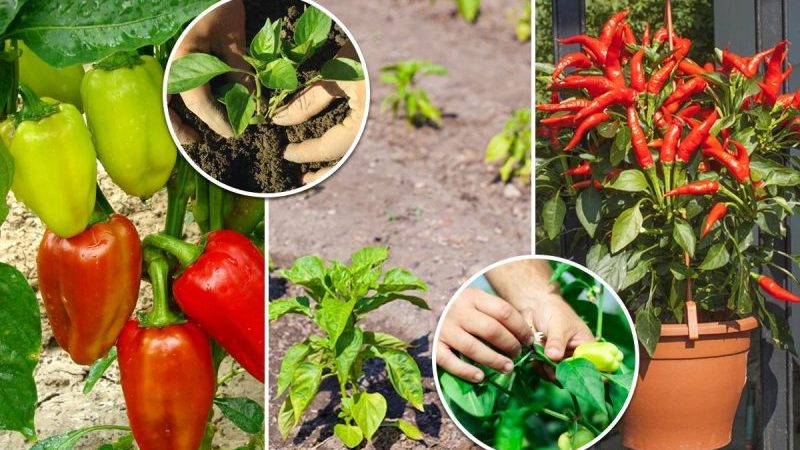
To accelerate the ripening of fruits, various methods are used:
- during the period of vegetative growth of the bushes, they pinch and cut off weak shoots;
- when fruiting, foliar dressing is applied: using solutions of potash and phosphate fertilizers;
- at the end of August, remove the remaining flowers;
- in early to mid-autumn, small peppers that have not matured are cut off. This will give strength to the bushes to grow large fruits before the onset of cold weather;
- to accelerate the ripening of vegetables, at the end of autumn, the culture is watered with warm water (+ 45 ... + 50 ° C) under the root, without touching the green mass;
- in autumn, in cold nights, the bushes are covered with agrofibre or plastic wrap;
- tear off most of the leaf mass from plants for better ripening of fruits;
- so that the vegetables ripen faster, at the end of the season, they loosen the ground around the bushes as deep as possible.
Maturity degrees
Fruits go through two stages of maturity: technical and biological.
With technical ripeness, vegetables reach their optimal size, taste and useful qualities, but have not yet acquired the color inherent in the variety. After harvesting, such fruits are transported, stored, sold.
Vegetables at the stage of technical maturity are green or pale yellow, sometimes almost white. They are selectively removed every 6–8 days. Harvesting is carried out in late autumn, before the first frost. With the appearance of constant cold weather, the remaining harvest is completely removed.
If the fruits are placed in a warm, bright place, they will acquire the appropriate color in a short time.
Biological maturity is the physiological ripeness of peppers when they acquire their final color, turning red, yellow, orange.
Reference! If the bell pepper was picked at this stage, it will not last long.
3-4 weeks pass from technical to biological maturity of vegetables. During this period, the content of vitamins, sucrose and other valuable substances in the fruits increases.
The degree of biological ripeness of the bell pepper is determined by slight pressure on the skin. If you hear a slight crunch, then the vegetables are fully ripe.
How to ripen hot peppers
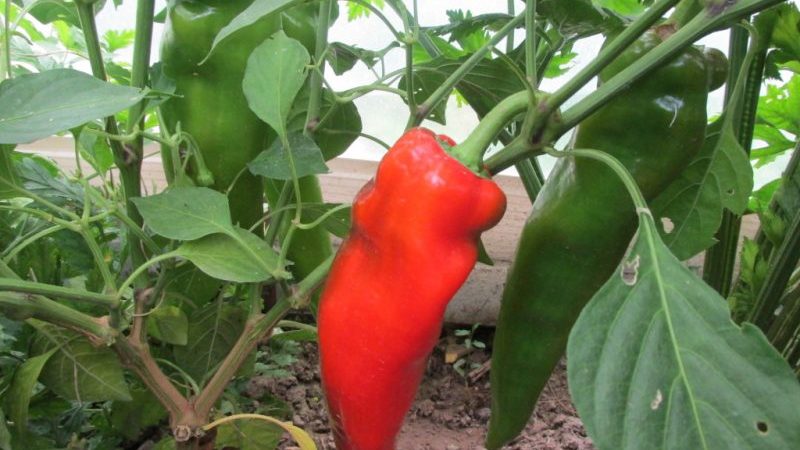
Such fruits begin to take off when they turn brown. Pluck them as they ripen. It is believed that the redder the fruit, the sharper it is. Hot peppers are harvested for drying in a state of biological ripeness. Its walls are thin, so the fruits dry quickly when drying... Ripe pods are picked for seeds or storage.
For storage, choose vegetables without damage, leaving 2 cm of the stalk. How to make hot peppers turn red faster? To do this, they are strung on a thick thread, piercing the bases, and hung in the kitchen or on the balcony.When dried, the fruits ripen and change color, becoming a rich red color. After that, they are transferred to a dry, cool room.
Hot peppers are also fed on a sunny windowsill for 3-4 days. The vegetables are periodically turned over so that the sun evenly warms all sides. During this time, the fruits gain the necessary pungency.
Important! Green vegetables are not suitable for ripening. Collected in this form, they begin to rot.
Brown peppers in a plastic bag with holes made are placed in the refrigerator. After a week, the fruits turn red.
How to store and ripen peppers for seeds
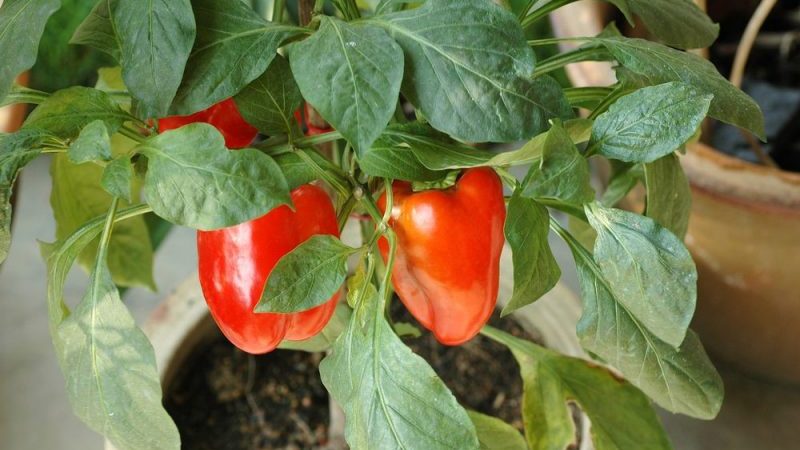
Many gardeners grow proven varieties of bell peppers, and harvest seeds from the harvest. To do this, vegetables are removed at the stage of biological ripeness, but if the crop is not ripe before the onset of cold weather, it is ripened at home. Seeds obtained from artificially ripening vegetables have a higher germination rate and germination rate than those collected from fruits grown on bushes.
The duration of the ripening of the crop depends on the size of the peppers, their degree of ripeness and storage conditions. Vegetables are placed in a warm dry room with a temperature of + 28… + 30 ° C. Thin-walled varieties withstand 3 days, thick-walled ones - 6-7 days. In ripe peppers, the stalk with seeds is removed and dried for another 3 days at + 35 ... + 40 ° C. After that, the seeds are freed from the pulp and kept at + 55 ° C, folded in paper bags and stored in a dry place at a temperature of + 18 ... + 25 ° C.
Conclusion
It is easy to speed up the process of ripening peppers. By removing unripe vegetables from the bushes, farmers help the plants maintain the strength to form new ovaries and ripen the remaining green fruits. The more vegetables at the stage of technical ripeness are removed from the bush, the more new ovaries will appear.